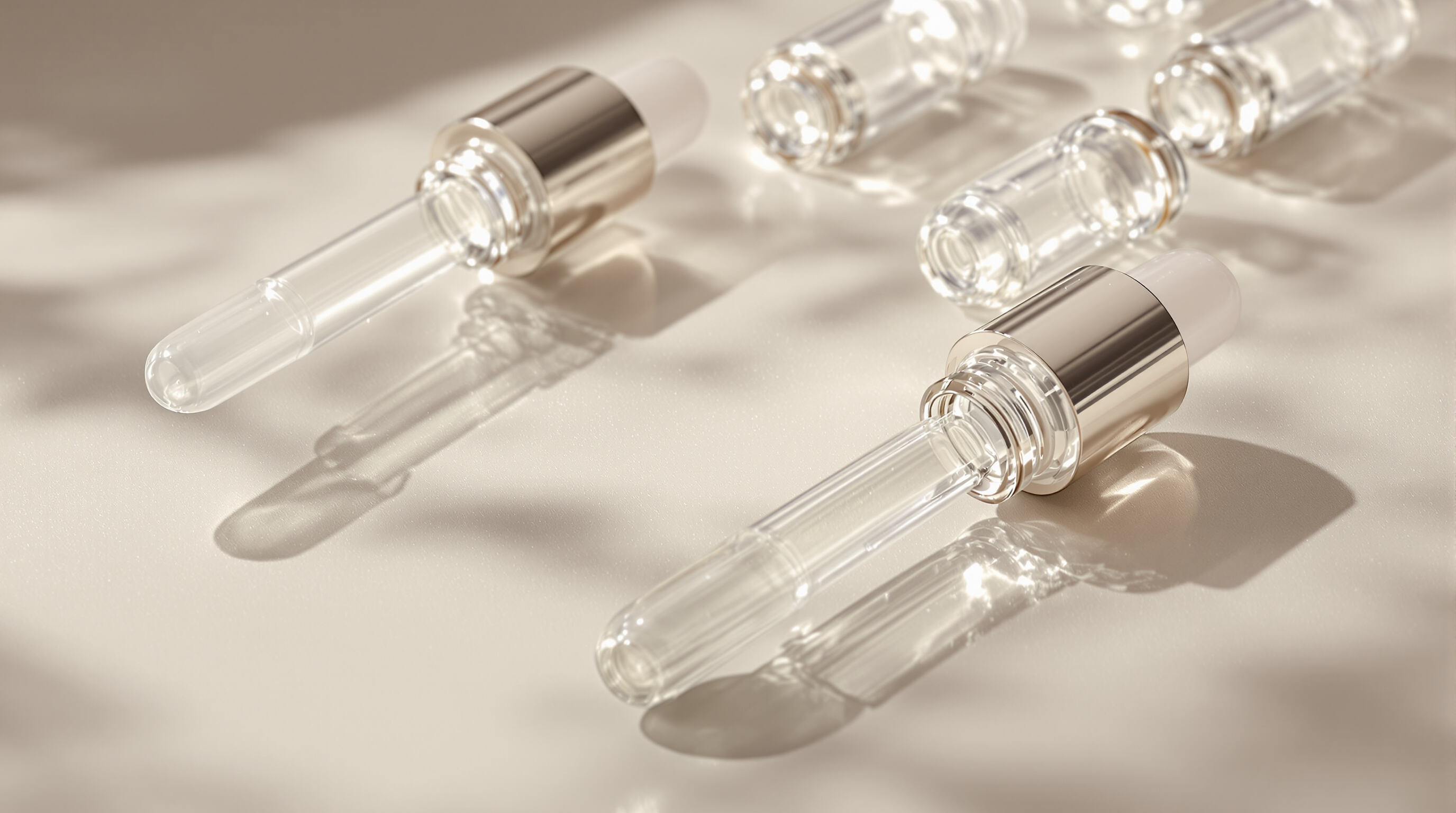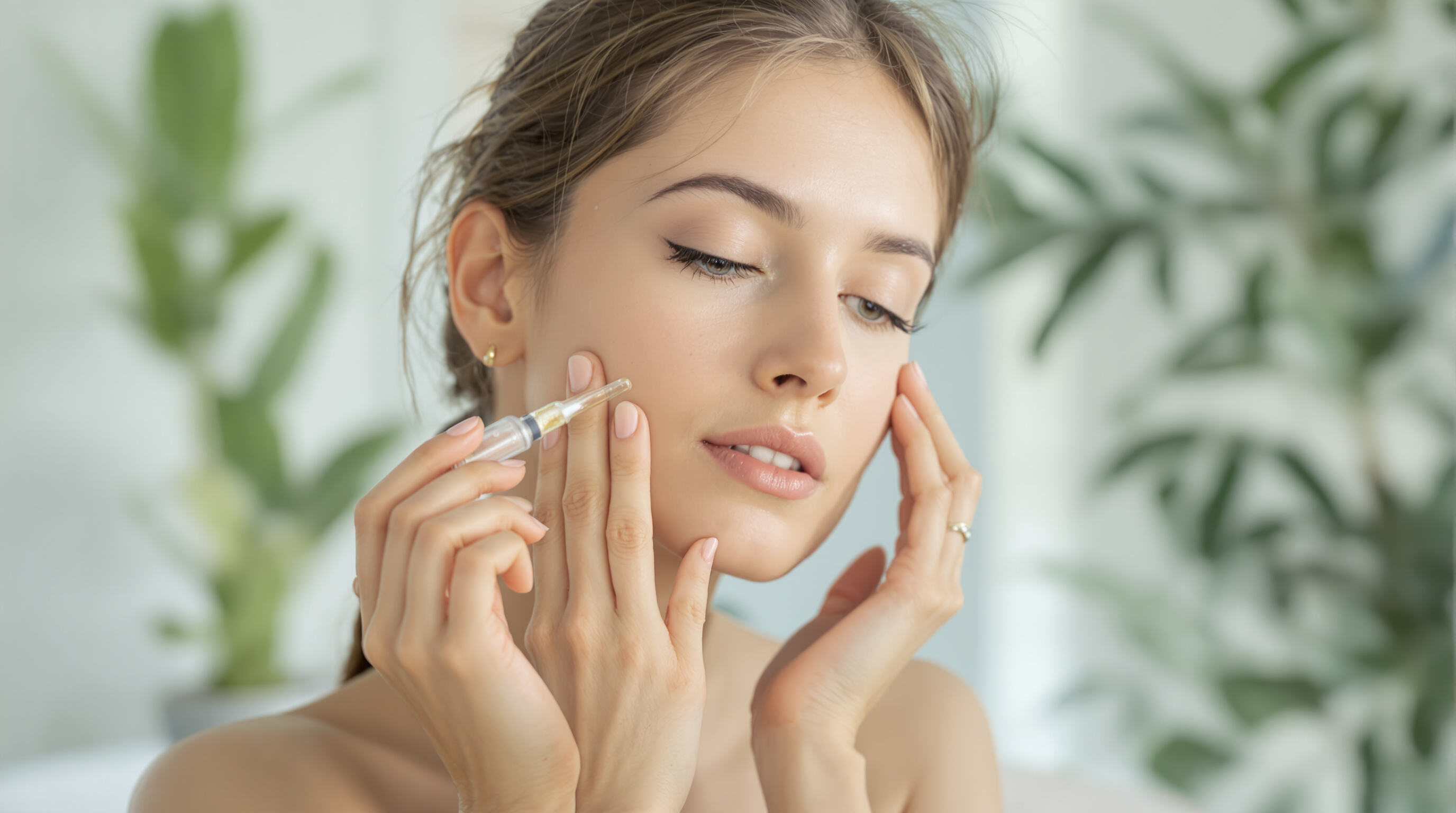Understanding Ampoule Serum: Definition and Core Benefits

What Is an Ampoule Serum in Skincare?
Ampoule serums work as concentrated, one-time treatments that pack way more punch than regular serums. They contain anywhere from 5 to 10 times the amount of active stuff inside. These powerful formulations go after specific skin issues when they pop up, things like dryness, dark spots, or sagging skin. The manufacturers often put special ingredients in there too, like stabilized vitamin C or various peptides that get absorbed better. Regular face serums we use every day don't need these fancy packaging tricks. But ampoules? Most come sealed in those little glass bottles to keep everything fresh and stop the good stuff from breaking down. That's why they're so great for sensitive ingredients like retinol derivatives which can turn bad really fast if exposed to air.
High-Concentration Actives: Why Ampoule Serums Deliver Faster Results
A 2023 dermatological study found ampoules achieve 73% faster visible improvements in hydration and texture compared to standard serums. This enhanced performance stems from:
- Targeted delivery: Hyaluronic acid at optimized molecular weights enables multi-layer skin penetration
- Barrier repair: Ceramide-rich formulations restore stratum corneum integrity in 14 days—half the time of conventional creams
- Stable pH environments: Niacinamide delivered at 10% concentration effectively reduces inflammation without irritation
The high potency and precise formulation allow ampoules to deliver noticeable results within days, particularly during periods of skin stress or environmental damage.
How Ampoule Serums Differ from Essences and Regular Serums
| Factor | Essences | Regular Serums | Ampoules |
|---|---|---|---|
| Concentration | 1–3% actives | 5–8% actives | 10–15% actives |
| Use Case | Prep skin | Daily maintenance | Crisis intervention |
| Packaging | Multi-use bottles | Airless pumps | Single-dose vials |
While essences prepare the skin and serums maintain baseline health, ampoules function as short-term interventions. A 14–28 day treatment cycle typically yields 8–12 weeks of sustained benefits, thanks to their concentrated actives and protective packaging.
Ampoule Serum for Dry and Dehydrated Skin: Intensive Hydration and Barrier Support
Targeting Dryness with Nutrient-Rich, Hydrating Ampoule Formulas
Ampoule serums tackle dry skin by packing powerful combinations of moisturizing ingredients. These specialized formulas for really thirsty skin often mix hyaluronic acid, which can hold about a thousand times its own weight in water, with plant-based oils such as squalane or jojoba oil. The humectants in these products pull moisture right into the outer skin layers, whereas the oils create a shield that helps keep skin from losing too much water throughout the day. A study back in 2023 showed pretty impressive results too. Eight out of ten people who used these hydrating ampoules every day noticed their skin wasn't so flaky after just two weeks of regular application.
Restoring the Moisture Barrier with Hyaluronic Acid and Ceramide Ampoules
Ceramide based ampoules work wonders when skin barriers are damaged since ceramides actually form about half of our skin's natural lipid structure and help repair those gaps between skin cells that act like mortar in brick walls. Combine them with hyaluronic acid that has smaller molecules and they can really get into the deeper layers where they stimulate those water channel proteins called aquaporins, which helps keep moisture locked in for longer periods. Putting on a ceramide treatment first before applying a moisturizer containing peptides gives skin an extra layer of protection from the outside world. This two step approach is particularly helpful for people dealing with extremely dry conditions or sensitive skin types that react easily to environmental stressors.
Recommended Usage Frequency and Layering with Moisturizers
People with dry skin usually get good results applying ampoule serum about two times a day. After washing face when skin is still slightly wet, put on 2 or maybe 3 drops of the serum first thing. Then slap on some moisturizer pretty quick after that, ideally within a minute or so to really trap in moisture. When it gets cold outside or living somewhere super dry, combining a hyaluronic acid based ampoule with a rich night cream that has shea butter works wonders. For folks dealing with red patches caused by dryness, steer clear of products with exfoliating acids altogether. Better to go for those specially formulated ampoules that sit around pH level 5.5 to 6.5 range. These help strengthen the skin's natural defenses against irritation without causing further damage.
Ampoule Serum for Oily and Acne-Prone Skin: Clarifying and Balancing Benefits

Managing Sebum and Breakouts Without Over-Drying
Ampoule serums for oily and acne-prone skin balance sebum regulation with essential hydration. Lightweight formulas often blend hyaluronic acid with natural astringents like tea tree extract or witch hazel, which absorb excess oil and deliver antibacterial action to active breakouts—without stripping the skin.
Niacinamide and Salicylic Acid Ampoules: Proven Efficacy in Oil and Acne Control
Studies show that using products containing 2% niacinamide can cut down on skin oil production by around 25% after about two months according to research published in the Journal of Dermatological Science back in 2022. That's why many oil control serums now feature this ingredient prominently. Pairing niacinamide with salicylic acid works wonders too since salicylic acid helps unclog those stubborn pores. The combination tackles both problems at once really well. People who stick with these treatments regularly often notice their blackheads disappearing by about 60-70% and see a significant drop in redness and pimples after sticking with them for roughly three months straight.
Non-Comedogenic Formulations: Maximizing Treatment While Preventing Clogged Pores
Innovative ampoule technologies employ micro-encapsulated actives and low molecular weight ingredients (<500 Daltons) to ensure deep penetration without residue. Silicone-free textures and breathable polymers like dimethicone crosspolymer protect against pollutants while minimizing comedogenic risk. Third-party testing shows 98% of users experience no additional congestion when switching to these non-comedogenic formulas.
Ampoule Serum for Sensitive and Reactive Skin: Safety-First Approaches
Minimizing Irritation Risks with Gentle, Fragrance-Free Ampoules
People with sensitive skin often find relief in ampoule serums that skip fragrances and limit preservatives while packing in calming plant extracts. Research published in the Journal of Cosmetic Dermatology back in 2023 points to ingredients such as centella asiatica, chamomile, and oat extract helping reduce inflammation and boost moisture levels. Interestingly, around 7 out of 10 individuals with reactive skin noticed reduced redness when using these kinds of products consistently over time. For best results, look for lightweight formulas that soak into the skin quickly without leaving behind any residue that might cause irritation later on.
Dermatologist Guidelines for Using Potent Actives on Sensitive Skin
Dermatologists recommend:
- Patch-test new ampoules behind the ear or on the jawline for 48 hours before full application
- Begin with 2–3 weekly applications, gradually increasing frequency as tolerance develops
- Pair active ingredients like vitamin C or niacinamide with ceramide-based moisturizers to offset potential dryness
This cautious approach allows sensitive skin to benefit from high-potency treatments without compromising comfort.
Avoiding Overuse: When High Potency Becomes Too Much for Delicate Skin
Gentle ampoules might still be too much for sensitive skin when applied too often. People usually notice problems like burning sensations, dry patches, or worse redness when they push past their skin's limits. When dealing with a breakout situation, stick to applying just once a day max. For regular upkeep, most folks find that going 3 to 4 times weekly works well with a simple moisturizer in between treatments. A recent study looked at this approach back in 2023 and found about 8 out of 10 people saw good results sticking with that schedule. And remember not to pile on several strong products at once since mixing them can really mess with the skin barrier and cause more trouble than help.
Customizing Ampoule Serum Use for Combination Skin and Specific Concerns
Zonal Application: Tailoring Ampoule Use for T-Zone vs. Cheeks
People with combination skin often find that applying different serums to specific areas works wonders. The oily parts of the face, usually the forehead, nose, and chin area, need something light that won't sit heavy on the skin. Look for products containing ingredients like salicylic acid or niacinamide which can tackle excess shine and make those pesky pores look smaller. Meanwhile, the cheeks tend to be drier so they require something thicker. Serums packed with hyaluronic acid or ceramides work great here because they lock in moisture without feeling greasy. Using separate products for these different zones helps avoid problems like dry patches or breakouts while still getting good results from whatever treatments are being used.
Targeting Multiple Concerns: Brightening, Anti-Aging, and Texture Refinement
Ampoule serums today address multiple concerns at once thanks to their carefully combined ingredients. Take vitamin C paired with ferulic acid for instance they team up pretty well to fade those pesky dark spots while also giving a real boost to collagen production which helps fight aging signs. Then there are those formulas loaded with peptides that actually make skin feel smoother and can really cut down on the appearance of those little wrinkles we all get. For best results, most dermatologists recommend applying these concentrated treatments right after washing your face and using toner, but definitely before slapping on thicker moisturizers or sunscreen in the morning routine.
Multi-Benefit Ampoules: Rising Trends in Personalized Skincare Solutions
The beauty world is seeing some exciting new stuff these days with those little glass bottles called ampoule serums. These products pack a punch by bringing together three major benefits all in one stable formula that won't mess with your skin's natural balance. Top companies are getting creative too, selling kits where customers can pick and choose what goes into their serum. Some folks might want extra panthenol for when their face feels irritated, while others reach for squalane to keep skin looking plump and youthful depending on how their complexion is acting that day. Skin doctors often tell people to test any mixed ampoule on a small spot first before applying everywhere. Most experts recommend sticking to just one or maybe two spots at most during regular skincare routines so sensitive zones don't get overwhelmed.
FAQs
What is the primary difference between ampoule serums and regular serums?
Ampoule serums are highly concentrated with active ingredients, offering targeted treatment for specific skin concerns, while regular serums generally provide daily maintenance with lower concentration of actives.
How often should I use an ampoule serum?
The usage frequency can vary depending on skin type and the specific product. Generally, those with dry skin benefit from using it twice daily, while sensitive skin types may start with 2–3 times a week.
Are ampoule serums suitable for sensitive skin?
Yes, especially those that are fragrance-free and formulated with calming ingredients like centella asiatica and chamomile.
Can ampoule serums replace my regular serum and moisturizer?
No, ampoule serums are used for targeted treatment and should complement your existing skincare routine, not replace the other essential products like moisturizers and regular serums.
Table of Contents
- Understanding Ampoule Serum: Definition and Core Benefits
- Ampoule Serum for Dry and Dehydrated Skin: Intensive Hydration and Barrier Support
- Ampoule Serum for Oily and Acne-Prone Skin: Clarifying and Balancing Benefits
- Ampoule Serum for Sensitive and Reactive Skin: Safety-First Approaches
- Customizing Ampoule Serum Use for Combination Skin and Specific Concerns
- FAQs

